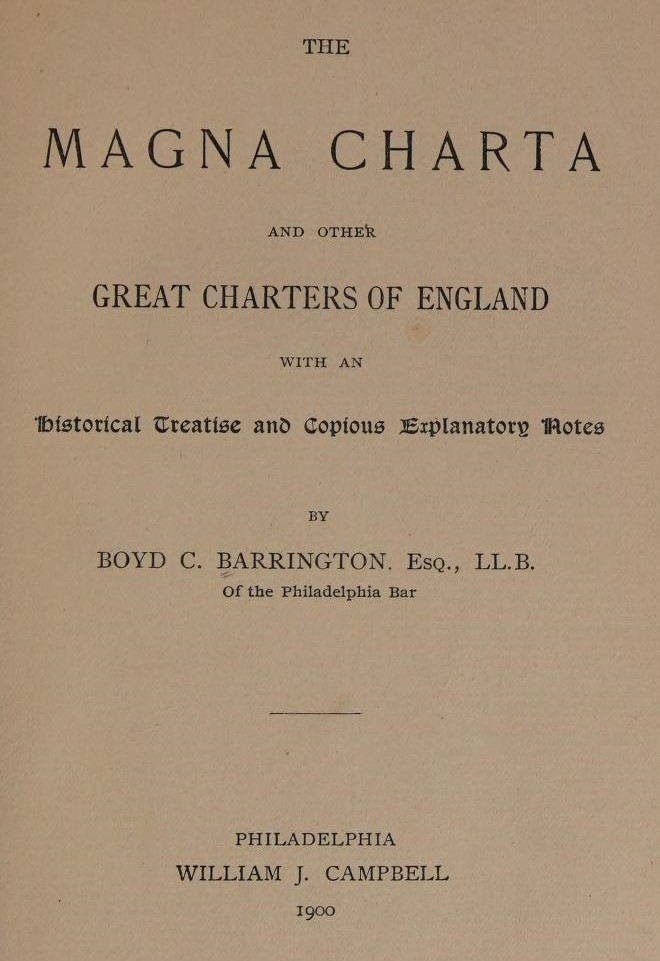Boyd C. Barrington, The Magna Charta and Other Great Charters of England (1900)
As a child, Robert Menzies was schooled in the ‘Whig view’ of British history, which depicted a long and victorious struggle to win parliamentary supremacy and forge the world’s most successful and enduring system of democratic governance. At the centre of this triumphal narrative sat Magna Carta, the formative and definitive moment in which the English people first demanded their essential rights from a despotic monarch, setting out the main battlelines for the political conflict that was to rage over the subsequent centuries. This was an inspiring tale that did much to shape the world-view of not only Menzies, but many Australians of his generation.
So much so, that when Menzies found himself prime minister at the outbreak of World War II, he inevitably framed the contest as ‘a continuance of that great struggle for freedom which has been the moving force in our history from Magna Carta’. Later, as a peacetime leader, Menzies would seize the opportunity to purchase Australia’s own original copy of the 1297 version of the Charter, as a fitting tribute to the hundreds of years’ worth of sacrifices that had gone into winning the liberties that Australia presently enjoys.
While Menzies was laudatory in his praise of Magna Carta’s significance, he had a nuanced view of the historical reality that the Charter’s mythology has oft-times obscured. He admitted that the rebellious Barons who extracted a profound list of concessions from a reluctant King John ‘knew nothing about democracy, and it is not supposed that they thought that they were establishing some form of democracy, because they did not think so at all. But, in point of fact, what they did that day has had a good deal to do with the true foundations of democracy, as it developed in later centuries.’ Because it ‘seized the imagination of men of intelligence’ who would use it as precedent and inspiration for their own battles for freedom.
When he attended the commemorations in London for the 750th anniversary of the sealing of the Charter in 1965, he would add that ‘the great thing about Magna Carta was that it put into form for the first time something which had been instinctive in Britain since the beginning of time’ – referring to the landmark due process provisions which helped to establish the Rule of Law. On that occasion, Menzies was articulating more than he perhaps understood, because the Charter was itself intended to be an annunciation of customary rights defined by Anglo-Saxon culture stretching back well before the Norman Conquest. And while the barons were themselves overwhelmingly Norman and often held prejudices against those their ancestors had subdued, they were more than happy to culturally appropriate a tradition that gave them greater liberties. Drawing on the supposed Laws of Edward the Confessor and a burgeoning Christian theology of freedom, embodied in the Archbishop of Canterbury Stephen Langton – who is rumoured to have drafted the Charter, & who established the modern system of dividing the Bible into chapter & verse.
Indeed, as Summoning Magna Carta: Freedom’s Symbol Over A Millenium has argued, the Charter’s story reveals the importance of culture and Magna Carta’s role as normative cultural icon, in upholding individual rights. As shown in Britain’s Glorious Revolution, the American Revolution, and even the successful push to secure self-government for the Australian colonies in the 1850s – when William Wentworth’s pivotal ‘Declaration and Remonstrance’ directly invoked Magna Carta, in what Henry Parkes would later describe as ‘one of the foundation-stones of the fabric of our constitutional liberties’.
The idea that it is ultimately history and culture, rather than mechanisms or guarantees, which maintain our freedoms is one that Menzies was favourably inclined towards. During the debates over a proposal to include a short Bill of Rights in the Australian constitution which occurred during the 1940s, he argued:
‘we are British people and we do not need to be reminded that we have inherited these established principles of government from our English ancestors, and that we do not need some solemn piece of writing in a Constitution to make us completely determined that our inherited freedoms will not be taken away from us either by despots or by elected persons… In the last resort it will be found that the only real assurance of freedom… will be a real spirit of freedom in the minds of the people. But if the people at any time became so carried away as to seek to destroy these freedoms, which are of our life blood, no pretty little form of words in the Constitution which they themselves made would prevent them from doing it’.
You might also like...
Sign up to our newsletter
Sign up for our monthly newsletter to hear the latest news and receive information about upcoming events.


